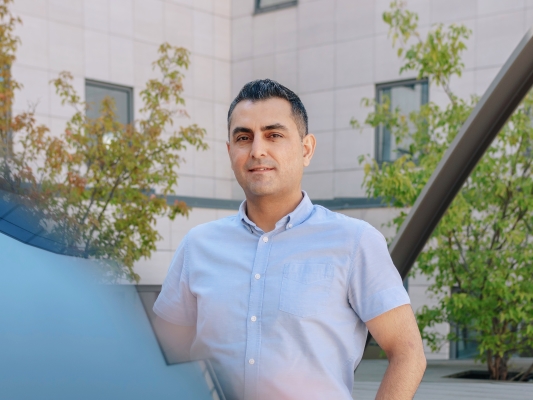 Ahmad Gharanjik, CEO and Founder of Databourg Systems;
Credit: © Stephanie Jabardo / Silicon Luxembourg
Ahmad Gharanjik, CEO and Founder of Databourg Systems;
Credit: © Stephanie Jabardo / Silicon Luxembourg
Chronicle.lu recently had the opportunity to speak with Dr Ahmad Gharanjik, CEO and Founder of Databourg Systems, a spin-off of the University of Luxembourg's Interdisciplinary Centre for Security, Reliability and Trust (SnT), to learn more about this Luxembourg-based startup, its products and its uniqueness.
Databourg Systems, which specialises in data analytics and rainfall monitoring using satellite communication, has already successfully partnered with an environmental intelligence platform, Komunidad, to launch the first rain-monitoring system using satellite dishes in the Philippines.
Chronicle.lu: Please introduce Databourg Systems, plus yourself (including when and why you came to Luxembourg) and your role.
Ahmad Gharanjik: Databourg is an environmental data analytics company that has developed an innovative technology for rainfall monitoring using satellite communication. Databourg is a spin-off from the University of Luxembourg’s SnT. Databourg's rain monitoring sensors are already operational in France, New Zealand and Indonesia as well as in the Philippines, but it is continuing to expand into new markets in Asia and South America.
I'm Ahmad Gharanjik, originally from Iran. I came to Luxembourg in 2012 to do my doctoral (PhD) research in signal processing for satellite communications at both the University of Luxembourg and the KTH Royal Institute of Technology, Sweden. After my PhD, I started Databourg to further develop the rain monitoring idea which was started during my doctoral research.
Chronicle.lu: Please elaborate ON the reasoning behind Databourg being recognised as "The Rain Company".
Ahmad Gharanjik: Rain data plays a critical role in many applications, from weather forecasts and agriculture to early flood warning systems... and with climate change, it is getting more critical to have reliable weather and rain data.
For almost 90% of the earth's surface, there is no reliable rain data and the main reason is that rain sensors are very expensive. So, underdeveloped countries cannot afford to have a network of those expensive rain sensors.
So, with our technology, we decided to address this issue and developed a new way for rain monitoring in real-time in a very affordable and scalable way.
Chronicle.lu: Who is the main target customer of Databourg in terms of providing rainfall intelligence, monitoring and predictions?
Ahmad Gharanjik: Our first focus is underdeveloped countries in Asia. They are impacted heavily by climate change and our main customers are local governments and businesses. With our rain monitoring solution, we hope to help them to become climate resilient.
Chronicle.lu: Please tell us about the support Databourg has received from Luxinnovation and the Fit4Start programme, in particular.
Ahmad Gharanjik: For research and developments required for our monitoring solution, we received support from the Luxembourg Space Agency and the Luxembourg National Research Fund (Fonds National de la Recherche - FNR) through national programmes.
Chronicle.lu: Being a startup company, what were the main challenges you have faced and the accomplishments you have achieved so far?
Ahmad Gharanjik: In general, building a startup or any business is difficult but being a research-based startup is even more challenging. It requires a lot of research, patience and investment up front before having a market-ready product. I'm proud that now after years of hard work, our rain monitoring sensors are operational in four countries and we are providing real-time rain data to our customers. Our next challenge is to scale up our activities in different dimensions: regions, vertical products as well as sales which require more capital.
Chronicle.lu: Climate change, especially the heatwaves in Europe this year, has probably made rainfall rather unpredictable. How do you plan to integrate these changing weather patterns into your algorithm, which is likely to be based on past rainfall patterns?
Ahmad Gharanjik: Right, climate change impacted the weather patterns and increased extreme events. When we are developing our algorithms, we consider different types of weather events in order to make them robust against anomalies.
Chronicle.lu: Databourg already offers monitoring of rainfall data in real-time in nearby France. Is there a reason for not yet offering the same service in Luxembourg, or there is not enough demand from different businesses here?
Ahmad Gharanjik: In general, here in Europe, there are already quite good weather monitoring systems in place thanks to the national weather agencies. As mentioned before, our current focus is on underdeveloped regions where our system can be the main solution and generate more value.
Chronicle.lu: As sudden heavy rainfall can lead to flash floods, particularly following heatwaves, is Databourg planning to integrate water-level data from rivers, river basins and other water bodies to further help businesses and people in low-lying areas?
Ahmad Gharanjik: Currently, we are working with our partner companies for flood modelling and monitoring. Their system can integrate different data sources including water-level data.








